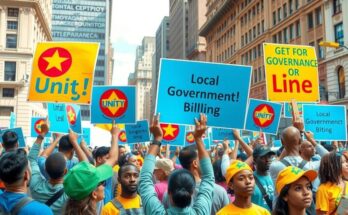Gabon held a referendum on a new constitution following the military coup that ended the Bongo family’s 55-year rule. Approximately 860,000 voters were urged to participate, with voting taking place at 2,835 polling stations across the capital. The ruling junta emphasized the importance of the referendum as a historical moment, with transitional President General Brice Oligui Nguema declaring, “We have a date with history.”
On Saturday, Gabon conducted a referendum aimed at adopting a new constitution, which the ruling junta has described as a pivotal moment for the nation. This political shift comes after the military coup which terminated 55 years of leadership by the Bongo family, consolidating power in the oil-rich central African state. The junta has actively encouraged the 860,000 registered voters through various media platforms to ensure their voices are heard in this critical vote, which offers a choice to either approve (green ballot) or reject (red ballot) the proposed constitutional changes. Polling commenced at 7:00 a.m. in the capital city of Libreville, with officials distributing ballot papers as voters arrived at the Lycee Leon M’Ba school. Authorities have stated that the turnout will be a significant factor in assessing the referendum’s success, highlighting the influence of official propaganda in shaping public sentiment. With a total of 2,835 polling stations open until 6:00 p.m., voter engagement remains a focal point for the transitional government. Transitional President General Brice Oligui Nguema took to social media to express the importance of the referendum, declaring, “We have a date with history,” alongside an image of himself prepared to cast his vote. The junta’s promotion of this vote underscores their commitment to transitioning governance following the recent upheaval, seeking to establish legitimacy and stability in Gabon’s political landscape.
The background of this referendum is rooted in Gabon’s recent political history, which saw the overthrow of the Bongo dynasty that had controlled the country since 1967. The military coup that occurred in 2023 marked a significant shift in governance, leading the ruling junta to propose a new constitution as part of their strategy to secure political legitimacy. This referendum is viewed as an opportunity for the junta to consolidate support among the populace and redefine the nation’s political framework in a post-Bongo era. The emphasis on voter participation and turnout illustrates the junta’s reliance on public endorsement to legitimize their rule.
In conclusion, Gabon’s referendum on a new constitution represents a crucial juncture in the nation’s governance, following decades of familial rule. The ruling junta’s characterization of this event as a historic moment reflects their intention to reshape political discourse and secure public backing. As voter turnout remains a critical indicator of public sentiment, the outcomes of this vote will significantly influence the future political landscape of Gabon.
Original Source: www.scmp.com




